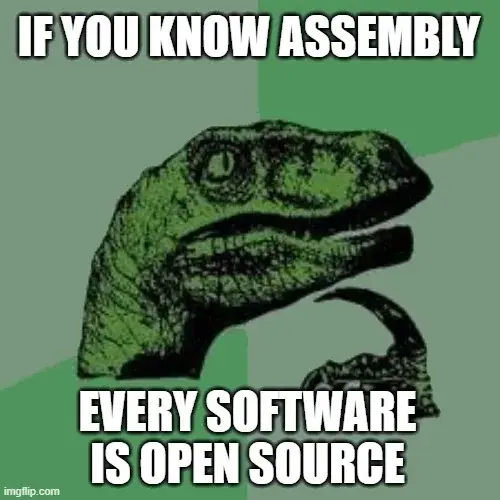this post was submitted on 26 Aug 2023
671 points (91.9% liked)
Programmer Humor
19555 readers
1216 users here now
Welcome to Programmer Humor!
This is a place where you can post jokes, memes, humor, etc. related to programming!
For sharing awful code theres also Programming Horror.
Rules
- Keep content in english
- No advertisements
- Posts must be related to programming or programmer topics
founded 1 year ago
MODERATORS
you are viewing a single comment's thread
view the rest of the comments
view the rest of the comments

All those assembly language instructions are just mnemonics for the actual opcodes. IIRC, on the 6502 processor family, JSR (Jump to SubRoutine) was hex 20, decimal 32. So going deeper would be really limited to not having access to the various amenities provided by assembler software and writing the memory directly. For example:
I started programming using a VIC-20. It came with BASIC, but you could have larger programs if you used assembly. I couldn't afford the assembler cartridge, so I POKED the decimal values of everything directly to memory. I ended up memorizing some of the more common opcodes. (I don't know why I was working in decimal instead of hex. Maybe the text representation was, on average, smaller because there was no need of a hex symbol. Whatever, it doesn't matter...)
VIC-BASIC had direct memory access via PEEK (retrieve value) and POKE (set value). It also had READ and DATA statements. READ retrieved values from the comma-delimited list of values following the DATA statement (usually just a big blob of values as the last line of your program).
I would write my program as a long comma-delimited list of decimal values in a DATA statement, READ and POKE those values in a loop, then execute the resulting program. For small programs, I just saved everything as that BASIC program. For larger programs, I wrote those decimal values to tape, then read them into memory. That let me do a kind of modular programming by loading common functions from tape instead of retyping them.
I was in the process of writing my own assembler so that I could use the mnemonics directly when I got my Apple //c. More memory and the availability of quite a few high level languages derailed me and I haven't touched assembly since.